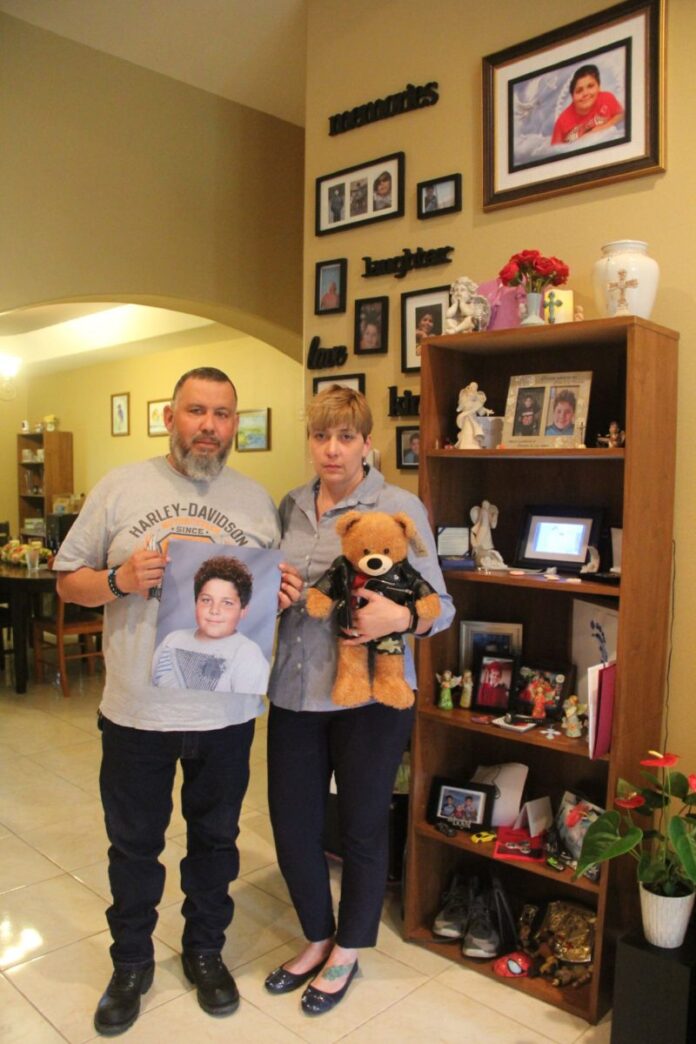HARLINGEN — Andrew Garza was known around the neighborhood as the good kid.
He liked to play basketball and even helped his neighbor take out the trash.
In school, the 12-year-old liked to be known as the class clown. He loved watching the Cowboys play on Sunday with his father.
Andrew had aspirations of being a linebacker for the Harlingen Cardinals. His favorite NFL player was Dallas Cowboy Sean Lee.
On the morning of Feb. 22, his mother, Jeanette, made a dash to the high school to take his older brother to band practice.
To her, it was a normal morning before the school day started.
But when she arrived back home, she found police and first responders taking Andrew away on a stretcher to an ambulance.
Shocked and confused at the sight of her son receiving medical attention, she pushed her way past police to see him struggling to stay alive.
“That is my son, I live here,” she told police.
Just minutes earlier, Andrew had taken his father’s gun and shot himself in the backyard.
He died that morning.
His parents believe Andrew was being bullied at school and it may have led him to that fateful decision.
But despite the tragedy, he would save two people’s lives when his family donated his heart, kidneys and liver. And he gave sight to two people.
Jeanette gave the order to donate any of her son’s organs that may help save a life.
Now, Andrew’s parents are on a mission to stop bullying forever and their journey has already begun.
On a mission
“We are not going to let Andrew’s death go without someone being held accountable for it,” said his father Cirilo, standing in his living room next to the memorial the family made for Andrew.
But the life of Andrew Garza lives on.
His mother Jeanette, 41, and father Cirilo, 45, have begun a quest to help others who are bullied.
They call it Andrew’s Journey.
Only two months after the loss of their son, the Garza’s organized a motorcycle ride home for two young girls from Los Fresnos who have been bullied on the school bus because of the way they look.
After school one day recently, the two sisters were picked up and taken home by the motorcycle riders. One of them was Andrew’s father.
“This has to stop,” Cirilo said. “These are two of the happiest little girls on the whole world right now.”
Cirilo said the motorcycle ride for the girls was meant to show them people care and will stand up to bullying for them.
“Doing that for them means a lot to us,” Cirilo said. “If our son had told us, we would have done the same thing.”
After the ride the girls received braided wristbands that signify the fight against bullying.
“We want to make sure what happened to our Andrew does not happen to somebody else,” Jeanette said.
Ultimately, their long-term goal is to see a stop to bullying and let people who are being bullied know they are not alone.
Getting involved
“My heart goes out to any family member who has lost a child,” Los Fresnos schools Superintendent Gonzalo Salazar said. “I can’t even imagine what the parents feel.”
Salazar said any time there is parental and community involvement it has a positive impact on the issues that afflict students.
“We welcome those opportunities and that type of involvement so long as the involvement does not create a disruption to the schools,” Salazar said.
Bullying is unwanted, aggressive behavior among school-aged children that involves a real or perceived power imbalance. The behavior is repeated, or has the potential to be repeated, over time. Both kids who are bullied and who bully others may have serious, lasting problems.
In order to be considered bullying, the behavior must be aggressive and include:
An Imbalance of Power: Kids who bully use their power such as physical strength, access to embarrassing information, or popularity to control or harm others. Power imbalances can change over time and in different situations, even if they involve the same people.
Repetition: Bullying behaviors happen more than once or have the potential to happen more than once.
- Feeling powerless in their own lives
- Someone else is bullying them
- Bullies are often jealous of or frustrated with the person they are bullying
- Lack of understanding or empathy
- Looking for attention
- Bullies come from dysfunctional families
- Bullies need to be in control
- Bullying behavior gets rewarded




